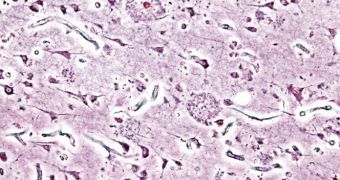A group of investigators demonstrated recently that it's possible to detect the development of Alzheimer's disease more than two decades before the first evidence appear in the brain. This can be done by surveying certain biomarkers in people with rare, inherited forms of the neurological disease.
The efficiency the new approach has in determining whether normal individuals are at risk of developing the condition has not yet been tested, but experts say that the biomarkers the two forms of Alzheimer's produce are most likely different.
Regardless of how limited this approach may be, the fact remains that researchers managed to demonstrate for the first time ever that it's possible to detect the neurodegenerative disorder between 10 and 20 years before symptoms appear.
Additional details of the work were presented on July 20 in Paris, France, at the Alzheimer's Association International Conference held there. The team focused on individuals with inherited forms of the condition because they go on to develop it at an earlier age than usual.
Whereas regular Alzheimer's sets in well into a person's senior years, inherited forms of dementia can make themselves felt while patients are in their 30s, 40s, or 50s, Technology Review reports.
Future drugs developed to address the condition in early-onset patients could then be translated into general use, for people suffering from the late-onset version of the condition. This is very important because memory loss, a key Alzheimer's symptoms, occurs after much brain degeneration takes place.
Brain imaging, blood tests, and cerebral spinal fluid (CSF) tests are just some of the methods that experts have tried over the past few years, in order to detect the disorder early on. However, these methods only have limited efficiency.
This is why experts at the Washington University School of Medicine (WUSM), led by neurologist Randall Bateman, decided to focus their work on families passing Alzheimer's from generation to generation. They say that this approach is a lot more effective in finding biomarkers.
“We can see changes over time, which allows us to estimate the order and magnitude of changes that occur leading up to Alzheimer's,” Bateman says, referring to the new screening technique.
“This is a way to tell us potentially how long of a window we have to treat it, and how we can use these markers in sporadic disease if the timing is the same. If we know people will get the disease and about when, perhaps we can treat them before they get the symptoms,” the expert concludes.

 14 DAY TRIAL //
14 DAY TRIAL //